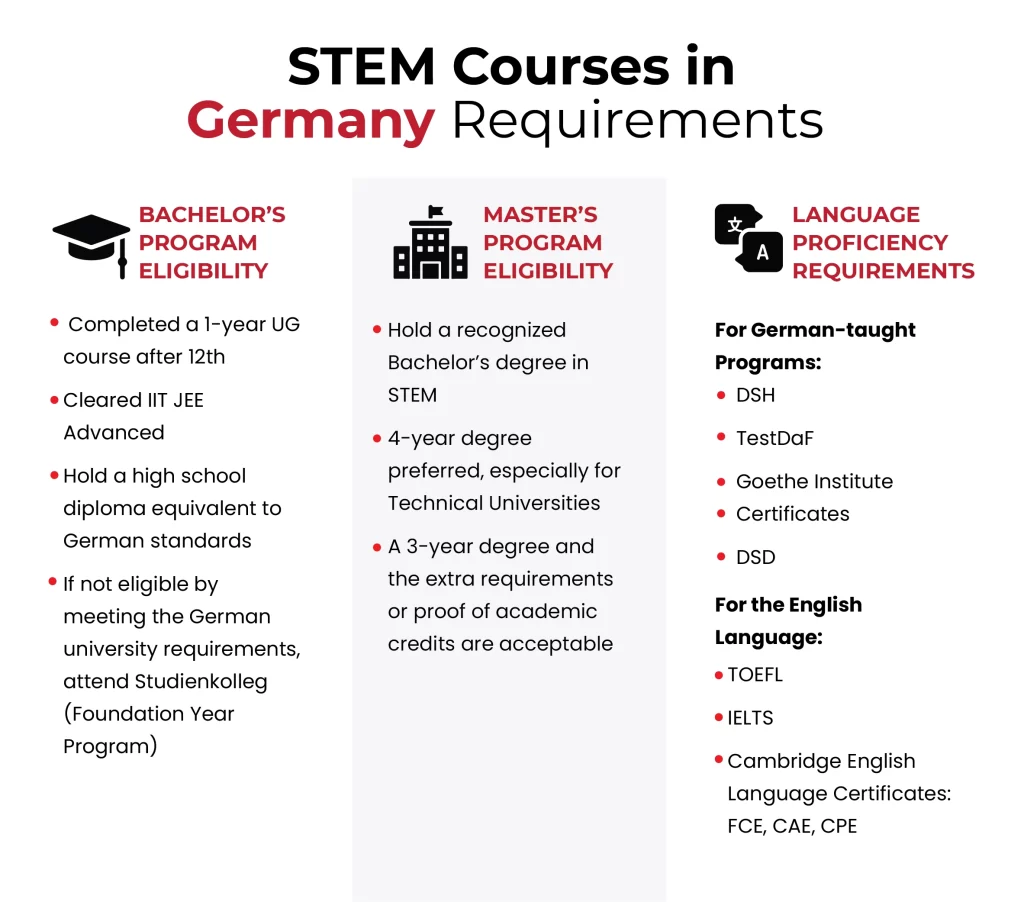STEM! (Science, Technology, Engineering, Mathematics)
It’s more than just a collection of disciplines. An acronym that represents innovation and future global progress.
STEM courses in Germany have consistently ranked to be the most in-demand course in recent years due to the shortage of skilled professionals. This offers an exciting opportunity to build a career in the German job market.
Read the blog to find out what exactly a STEM course is, explore top universities and fees, high-paying jobs and how it can benefit you as an international student.
Table Of Content
1What is the STEM Program in Germany?2Best STEM Courses in Germany for International Students3Top Universities in Germany for STEM Courses4STEM Courses in Germany Requirements5STEM Courses in Germany Fees6STEM Jobs in Germany7What are the Best Tips for International Students Studying STEM in Germany?8Frequently Asked Questions
What is the STEM Program in Germany?
STEM stands for Science, Technology, Engineering and Mathematics. It comprises multiple disciplines, promotes hands-on approach to teaching and has strong career prospects worldwide.
Now, why is Germany a popular choice for STEM?
Germany is renowned for its strong commitment in promoting STEM programs, particularly for international students. A key advantage of pursuing a STEM education is the global job opportunities it offers. Here are some major reasons for “Why Germany?” :
- Top universities
- Career prospects
- Wide range of courses
- Low or no tuition fees
- Industrial hub
Best STEM Courses in Germany for International Students
STEM is a broad term with numerous disciplines coming under it. There are a diverse range of STEM programs in Germany specifically curated for international students with higher earning potential. Here is a list of the best STEM courses in Germany:
| Computer Science & IT | Life Science & Biotechnology | Engineering | Environmental & Natural Science |
|---|---|---|---|
| Data Science | Biotechnology | Robotics | Environmental Engineering |
| Artificial Intelligence | Biochemistry | Electrical & Electronics Engineering | Renewable Energy |
| Cybersecurity | Molecular Biology | Software Engineering | Physics |
| IT Security | Pharmacy | Aerospace Engineering | Chemistry |
| Computer Science | Mechatronics |
Top Universities in Germany for STEM Courses
According to 2025 QS rankings, ten German universities rank among the top 200 globally. Studying at these top-ranked universities along with the best scholarships in Germany can enhance your career prospects and provide international opportunities.
Let’s look at the top universities for STEM courses in Germany:
| University | QS Ranking |
|---|---|
| Technical University of Munich | #28 |
| Ludwig Maximilians University of Munich | #59 |
| University of Heidelberg | #84 |
| Freie University of Berlin | #97 |
| RWTH Aachen University | #99 |
| Karlsruhe Institute of Technology | #102 |
| Humboldt-University of Berlin | #126 |
| Technische University of Berlin | #147 |
| University of Hamburg | #191 |
| Albert Ludwigs University of Freiburg | #212 |
STEM Courses in Germany Requirements
Bachelor’s Program
To apply for a STEM bachelor’s degree, you have to meet one of the following conditions:
- After 12th, if you have completed a one year undergraduate course or cleared entrance exams like IIT JEE Advanced, a direct application to university is possible.
- If your high school diploma(12th) is equivalent to German standards of education, direct admission is possible. You will have to check the eligibility in the university website or the official Anabin database, depending upon your country and course.
- If your high school education doesn’t meet the Germany university requirements, you will need to attend a preparatory course or foundation year (Studienkolleg) and pass the Feststellungsprüfung (FSP). This will prepare you for German higher education.
Master’s Degree
- You will need a recognized bachelor’s in any of the STEM fields.
- A 4 year bachelor’s degree is preferable especially for technical universities. A 3 year degree is acceptable along with the extra requirements or proof of academic credits.
Language Proficiency
Most of the Master’s degrees and PhD are offered in English language while Bachelor’s in German. So, when choosing a course, make sure of the language it is delivered and check the proficiency.
German language proficiency tests include:
- DSH (German Language University Entrance Examination)
- TestDaF (Test of German as a Foreign Language)
- Goethe Institut Certificates
- DSD (German Language Diploma)
For the English language proficiency certificate, you will have to take any of the standardized tests including:
- TOEFL (Test of English as a Foreign Language)
- IELTS (International English Language Testing System)
- Cambridge English language certificates: FCE (First Certificate in English), CAE (Certificate in Advanced English), CPE (Certificate of Proficiency in English)
Documents Required
- Academic Transcripts
- APS Certificate
- Feststellungsprüfung if attended Studienkolleg ( university assessment test)
- Proof of Language Proficiency
- Letter of Recommendation
- Proof of Fund
- Health Insurance
- Statement of Purpose (SOP)
- CV/Resume if asked
STEM Courses in Germany Fees
STEM courses in Germany are an excellent option for Indian students, thanks to its numerous affordable cities and universities. The fee structure varies between public and private universities. In most of the public universities there will be low or no tuition fee, only with a semester contribution required.
- In private universities in Germany, students are required to pay tuition fees ranging from €5,000 to €20,000 per year for STEM courses.
- In public universities in Germany, there will be no tuition fee in most of the cases including STEM courses. The semester contribution typically ranges from €100 to €350 per semester.
- Other expenses include accommodation, living cost, health insurance and transportation. This depends upon the city you choose to study as Germany has student-friendly cities making it affordable for them.
STEM Jobs in Germany
Germany is a leading destination with quality education and home to top-tier industrial and tech companies. Due to the shortage of skilled professionals in several STEM areas, Germany has become the hotspot for STEM careers. Let’s look at some of the high-paying STEM jobs in Germany:
1. Information Technology
- Data Scientist
- System Analyst
- Web Developers
- IT Technician
- Computer Programmer
2. Engineering
- Mechatronics
- Civil Engineer
- Electrical Engineer
- Automotive Engineer
- Marine Engineer
3. Natural Science
- Biotechnologist
- Pharmacologist
- Environmental Scientist
- Chemist
4. Mathematics and Data Analysis
- Financial Analyst
- Business Analyst
- Actuary
- Research Assistant
5. Robotics and Automation
- Robotics Engineer
- Mechanical Engineer
- Aerospace Engineer
What are the Best Tips for International Students Studying STEM in Germany?
If you have decided to study STEM courses in Germany, be sure to check out these tips mentioned below:
- Focus on strong academic preparation
- Choose the course and university aligning to your interests
- Learn the basic German language even though most of the courses are taught in English.
- Understand the curriculum and stay organized.
- Apply for internships and make use of university career services.
- Consider your cost of living and other expenses wisely.
- Explore part-time work.
- Organize the documents and apply for the student visa early.
- Apply for scholarships early. There are STEM scholarships specifically for students in STEM programs.
- Stay updated on visa rules
Conclusion
Germany is a dream destination for students seeking a world-class STEM education. We hope this blog has given you a clear understanding of how the country has earned its reputation for excellence in STEM education and careers.
What’s the next step? Are you ready to be a part of CanApprove successful clients? Connect with CanApprove and our expert team is ready to help you achieve your study abroad dreams.






